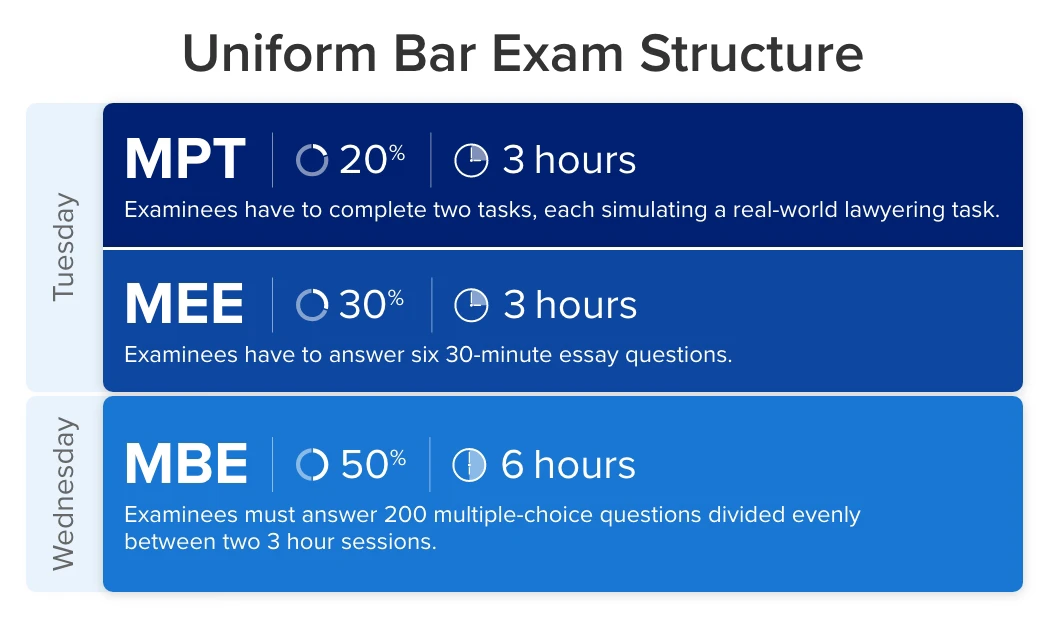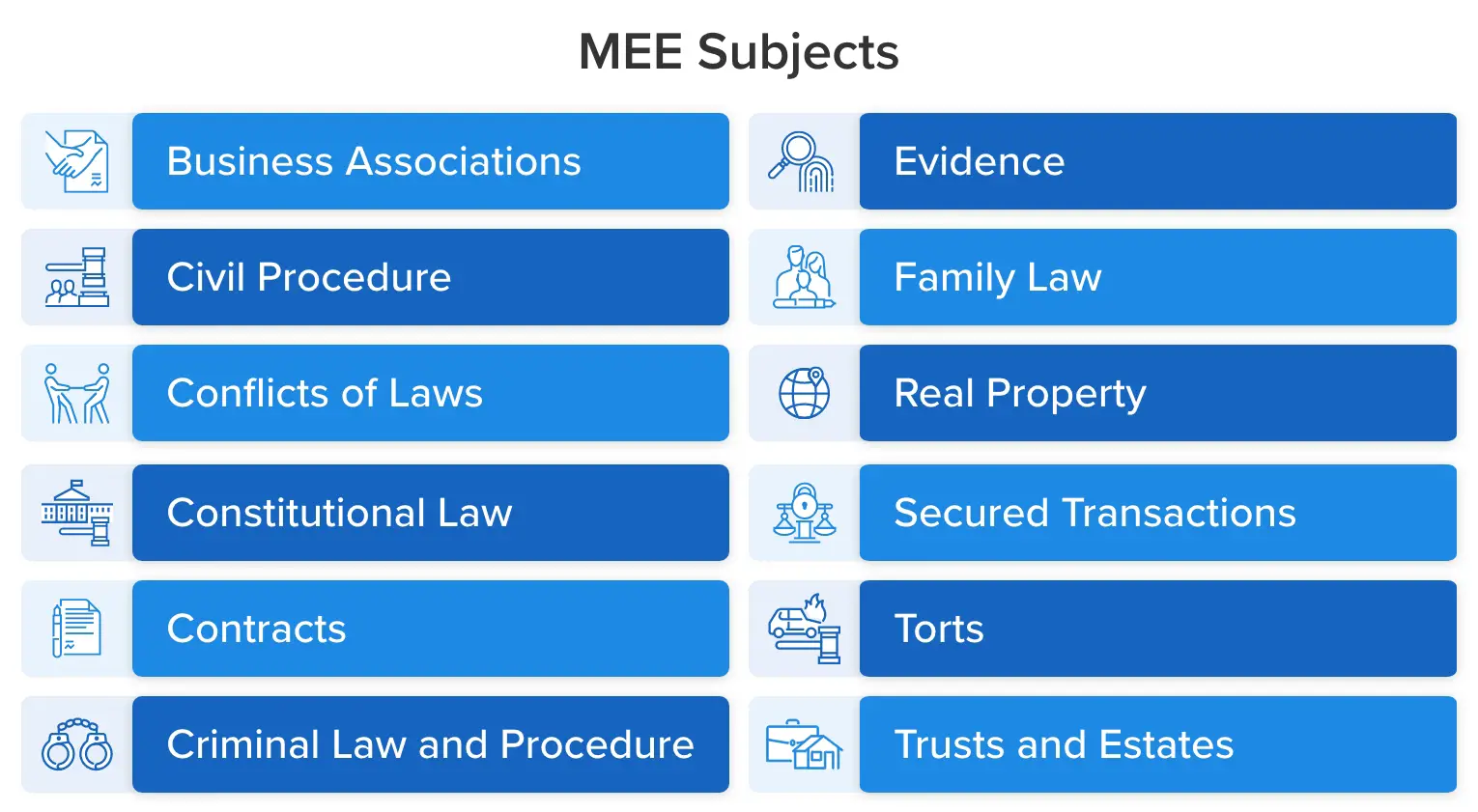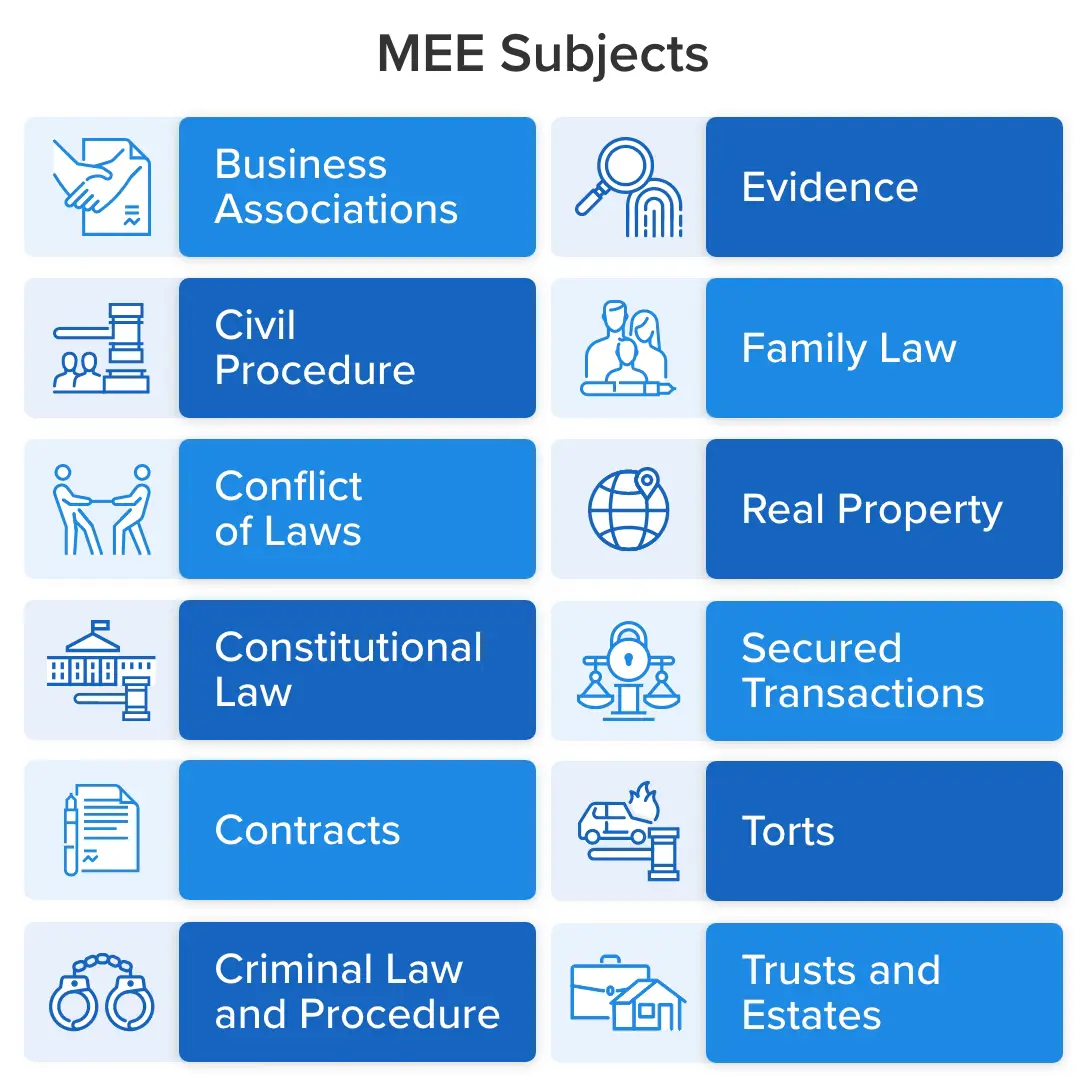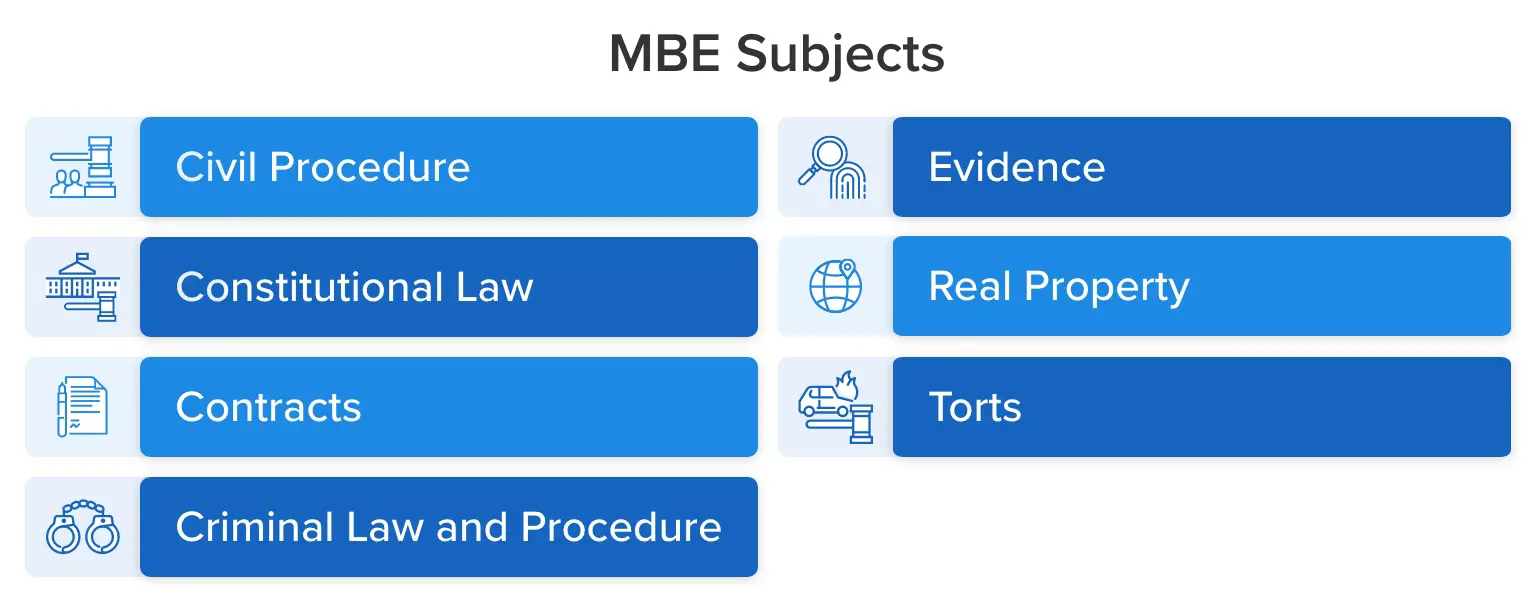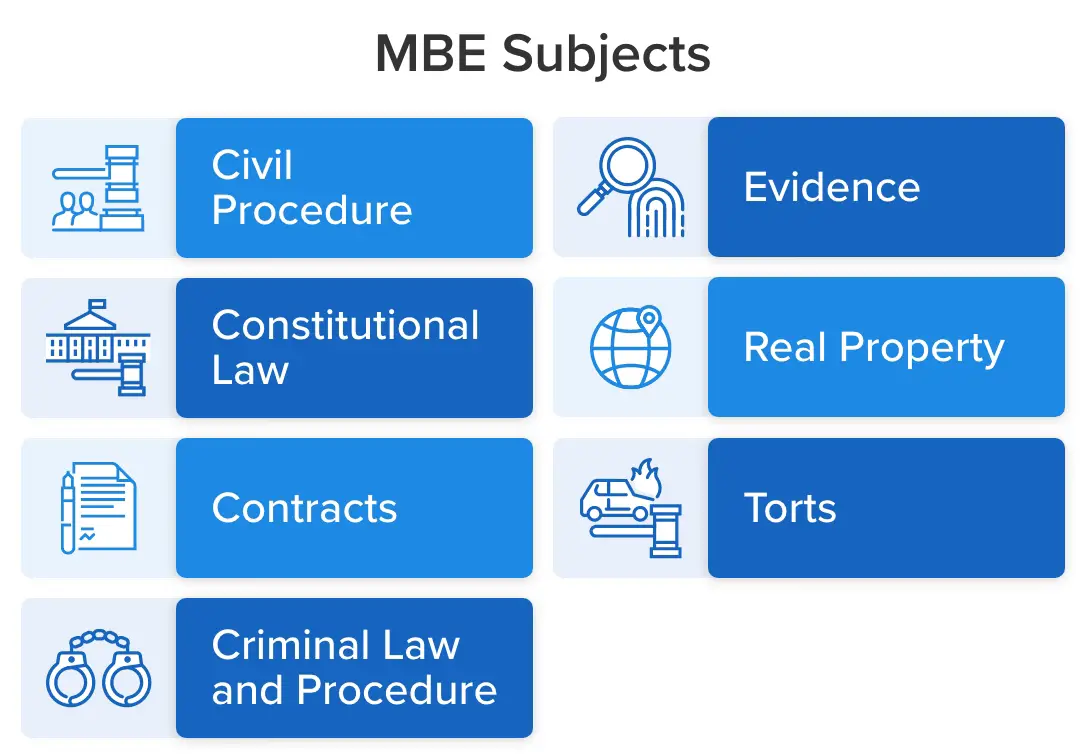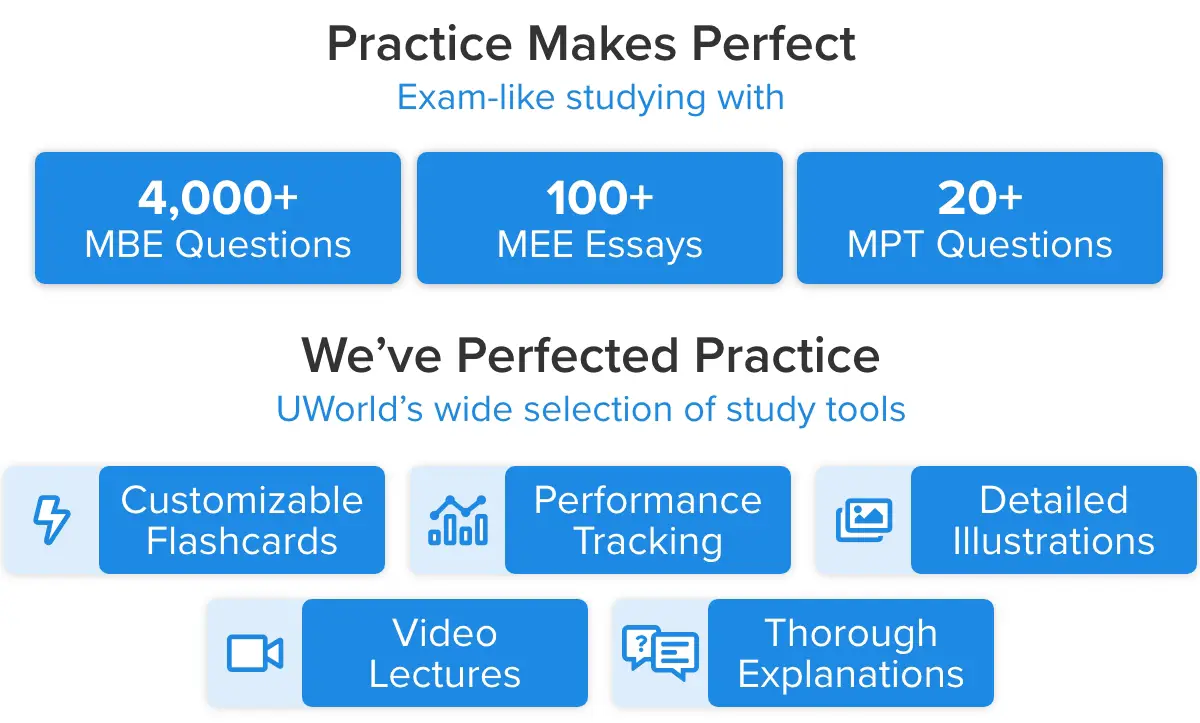The Hawaii Bar Exam
The Hawaii Bar Examination is among the more unique bar exams in the US. While Hawaii is not a Uniform Bar Examination (UBE®) jurisdiction, it administers all three components of the UBE plus a unique state component. Students or attorneys seeking admission to the Hawaii Bar must pass the Hawaii Bar Exam, though there are some expectations. Below you'll learn everything you need to know about the Aloha State's Bar Exam, including eligibility requirements, fees, pass rates, and how to apply.
Hawaii Bar Exam Structure
As noted above, the Hawaii Bar Exam has adopted the UBE structure but is not considered a UBE state. This is likely because Hawaii's state component score is combined with UBE component scores. Examinees must take the Hawaii Legal Ethics Exam in addition to the Multistate Bar Examination (MBE®), Multistate Performance Test (MPT®), and Multistate Essay Examination (MEE®). The UBE portion of the exam is structured as follows:
Hawaii Legal Ethics Examination
The Hawaii Legal Ethics Exam is administered on Tuesday morning. Examinees have 30 minutes to answer 15 multiple-choice questions based on the Hawaii Rules of Professional Conduct (HRPC).
Hawaii Bar Exam Dates, Requirements, and Scheduling
The Hawaii Bar Exam is typically administered on the last Tuesday and Wednesday of February and July. See below for information on exam dates, filing deadlines, eligibility requirements, and how to schedule your exam appointment.
Exam Dates
Unlike many jurisdictions, Hawaii does not have a tiered filing schedule that allows late filing for a penalty fee. In short, if you miss the filing deadline, you can't take the Hawaii Bar Exam. Filing deadlines for the February and July exams are as follows:
| Filing Periods | February 27-28, 2024 Exam | July 30-31, 2024 exam | Fee |
|---|---|---|---|
| Filing Deadline | November 1, 2023 | April 1, 2024 | $500 |
| Attendance Time | Exam Location |
|---|---|
| 7 AM | Hawaiʻi Convention Center 1801 Kalākaua Avenue Honolulu, HI 96815 |
Requirements
Candidates must meet the requirements stipulated in rule 1.3 of the Rules of the Supreme Court of The State of Hawaii. To avoid weeding through the legalese, here's a simple summary of said requirements:
- Education — You must have a Juris Doctorate (JD) degree from a law school accredited by the American Bar Association (ABA) or a degree from a foreign law school that the Board determines to be equivalent to a JD from an ABA-accredited law school.
- Practicing — If you are an attorney who hasn't graduated from an ABA-approved law school, you must have been practicing before the highest court in another US jurisdiction for five of the six years preceding their application.
- Character and Fitness — You must demonstrate good moral character and fitness to practice law. This includes disclosing any criminal history, disciplinary actions, or other issues that may affect your suitability to practice law.
- MPRE — Must be taken and passed not earlier than 2 years before the Hawaii Bar Examination, and the Multistate Professional Responsibility Examination (MPRE®) score must be officially reported to the Board not later than 1 year after the date of notification of passing the Hawaii Bar Examination.
- Bar Exam Application — You must submit a completed application and pay the required fees by the deadline set by the Board.
- Citizenship or Immigration Status — You must be a US citizen or have lawful immigration status.
- Residency — You must meet the Hawaii residency requirements as set by the Board.
Scheduling
To schedule your Hawaii Bar Exam, you must submit your application through the eBar App system, which is available from Monday to Saturday, 4 am to 12 am (HST), and Sunday, 12 pm to 12 am (HST). The process looks like this:
- Register with the Judiciary Electronic Filing and Service System (JEFS) by following these instructions.
- Select "Bar Applicant" as "Role."
- Receive your JEFS user ID and password.
- Use your JEFS user ID and password to complete and submit your application.
- Pay the filing fee.
- Look out for notices in your email inbox.
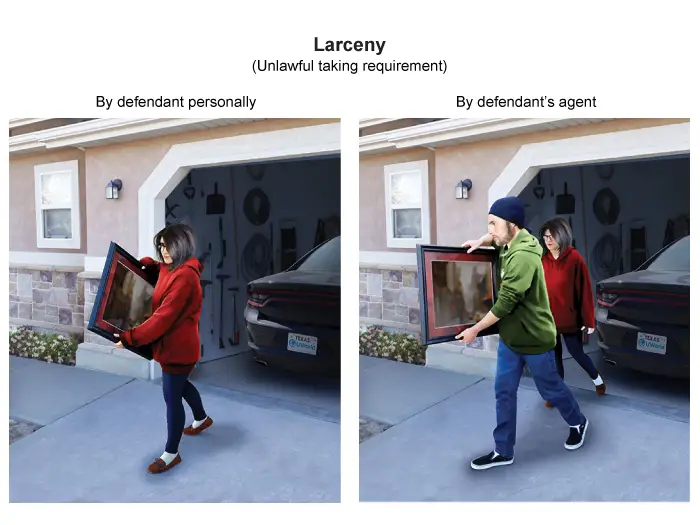
Hawaii Bar Exam Cost and Fees
The fee schedule for the Hawaii Bar Exam is simple compared to other bar exams. The cost of submitting your application is the same for first-time takers, repeaters, and attorneys, and there is only one filing deadline, so late fees don't apply.
| Application Fee | |||
| First-time takers | $500 | ||
| Repeat takers | $500 | ||
| Attorneys | $500 | ||
| Other Application Fees | |||
| Admission on Motion | $500 | ||
| Misc. Fees | |||
| Laptop use fee | $133.50 | ||
Payment Policies
Application fees for the Hawaii Bar Exam cannot be transferred to future exams or refunded. You may pay online via credit card or through the mail with a check or money order made out to the Board of Examiners. If you apply for laptop use, you'll pay the $133.50 fee through ExamSoft.
Cost-Saving Options
Between law school and Hawaii Bar Exam application fees, becoming a lawyer isn’t cheap. Fortunately, there are cost-saving options available. Richard Opportunity Grants are available to students who demonstrate financial need based on their FAFSA. The maximum award for law students is $4,000 and students must be enrolled for at least half-time. If you don’t meet those requirements, there are a number of external scholarships for which you may apply.
You can also try browsing the AccessLex Institute Law School Scholarship Databank for options better suited to you or check out the ABA, which offers 100+ opportunities and programs for young lawyers and law students. Even if you can’t obtain a scholarship, there are some basic things you can do to save money while preparing for the bar exam:
- Join a study group and split the cost of bar exam preparation materials among group members.
- Research free or low-cost study online study materials like past bar exam questions and answers to supplement commercial study aids.
- Some bar exam prep companies offer discounts or promotions to students who register early or refer friends to their program.
Hawaii Bar Exam Subjects and Topics
The HI Bar Exam tests a candidate's legal knowledge, analytical skills, and competence to practice law. It covers a range of subjects, from Constitutional Law and Contracts to Criminal Law and Evidence. Candidates will be assessed by their ability to apply legal principles, draft legal documents, and effectively solve problems to ensure they can competently represent clients and complete entry-level legal tasks.
Testable Subjects on the MEE
The MEE requires candidates to identify legal issues, apply relevant legal principles, and demonstrate their ability to analyze fact patterns and compose well-reasoned, organized, and concise written responses. Subject include:
Some subjects might show up in groups. Others may not show up at all. Up until exam day, the subjects the NCBE selects for any administration are kept secret. But historically, some have been put to the test more frequently than others. For instance, over the past ten years, Civil Procedure has been tested in practically every MEE, whereas Criminal Law has only been tested sporadically. Less common topics, however, might still be matched with others.
See our MEE Study Guide and Prep Tips for information on organizing your study schedule and figuring out what's vital so you can utilize your time efficiently. For thorough explanations of MEE subjects and sub-topics, see our MEE Subject Matter Outline.
Testable Subjects on the MBE
The MBE contains 200 multiple-choice questions divided evenly over 7 subjects. You'll notice that 7 x 25 does not equal 200. That's because 25 MBE questions are unscored questions that the NCBE pilots for future exams. There is no way to identify which questions are scored or unscored, so it's best just to imagine that they are all just as important. MBE subjects are as follows:
MPT Tasks
The Multistate Performance Test is designed to assess a candidate's ability to apply legal knowledge and skills to simulated legal tasks that a new lawyer might encounter in practice. Examinees are presented with faux case files and must work within the legal framework of a closed-universe jurisdiction known as "Franklin."
All the information necessary to complete the task is provided in the instructions and materials. Candidates are not expected to have any prior knowledge of the specific area of law being tested. Instead, they are evaluated on their ability to analyze the provided materials, identify the relevant legal issues, and apply the appropriate legal rules and principles to solve the problem presented.
Hawaii Legal Ethics Examination
The Hawaii Legal Ethics Examination consists of 15 multiple-choice questions covering the codes of conduct as laid out in the Hawaii Rules of Professional Conduct (HRPC).

Hawaii MPRE Requirements
The Multistate Professional Responsibility Examination (MPRE) is a standardized test administered by the NCBE. It's been designed to measure examinees' understanding of professional ethics rules and standards as they apply to the practice of law. To sit for the Hawaii Bar Exam, candidates must take and pass the MPRE within two years of taking the bar exam and report their official score no later than 1 year after passing the bar exam.
Hawaii MPRE Minimum Passing Score
In Hawaii, the minimum passing score for the MPRE is 85. This is the second-highest minimum passing score, only surpassed by California's minimum passing score of 86.
Hawaii Bar Exam Scoring, Results, and Pass Rates
The Hawaii Bar Exam is scored on a scale of 0 to 200. To pass, a candidate must achieve a score of at least 133. The total score is divided between MBE (50%) and the MEE, MPT, and Hawaii Legal Ethics Examination (50%). However, 133 is your scaled score, not your raw score. Scaled scoring ensures fairness across test versions. For example, the exam you take in February may be a different version than your friend takes in July. It would be unfair to grade them without taking this variation into account. Therefore, raw scores are calculated into scaled scores to solve for any discrepancies.
Exam Results and Pass Rates
Repeat taker pass rates for the Hawaii Bar Exam are significantly lower than those of first-time takers, which is a trend across all US jurisdictions. This is likely due to the fact that many individuals who fail their first bar exam move on to the next without changing their study strategy.
| Exam | Overall Pass Rate |
First-Timer Pass Rate |
Repeater Pass Rate |
Results Release Date |
|---|---|---|---|---|
| July 2023 | 63% | 75% | 18% | October 16 |
| Feb. 2023 | 54% | 58% | 48% | April 19 |
Here are the annual pass rates for the Hawaii Bar Exam since 2017 divided into first-time examinees and repeaters:
| Exam | First Timers | Repeaters | Overall | |||
|---|---|---|---|---|---|---|
| Year | No Of Candidates | Pass Rate | No. Of Candidates | Pass Rate | No. Of Candidates | Pass Rate |
| 2022 | 194 | 74% | 61 | 33% | 255 | 64% |
| 2021 | 216 | 74% | 53 | 60% | 269 | 71% |
| 2020 | 155 | 80% | 66 | 41% | 221 | 68% |
| 2019 | 193 | 73% | 79 | 37% | 272 | 63% |
| 2018 | 197 | 80% | 59 | 29% | 256 | 68% |
| 2017 | 210 | 76% | 64 | 41% | 274 | 68% |
Hawaii Bar Exam results are typically released 10-12 weeks following an exam administration. Results were released on October 26, 2023, and April 19, 2023, for the July and February 2023 exams, respectively.
Hawaii Bar Exam Reciprocity
Hawaii does not offer reciprocity in general. However, there are specific circumstances in which candidates may be admitted to practice without examination:
- Full-time faculty members at the University of Hawaii Law School who graduated from an ABA-accredited law school and have been admitted to practice in another US jurisdiction
- Full-time active-duty uniformed-service judge advocates may represent certain active-duty enlisted military personnel and their dependents (without additional compensation)
- ABA-accredited law school graduates who are actively licensed to practice law in another US jurisdiction and are employed by a civil legal service provider recognized as 501(c)(3) nonprofit organization may apply for limited admission and receive funds from the Indigent Legal Assistance Fund
There’s a reason Themis + UWorld is the only bar prep that consistently publishes its pass rates.

What Makes the Hawaii Bar Exam Unique?
First, Hawaii requires that examinees have taken and passed the MPRE before sitting for the bar exam. Second, Hawaii administers all three UBE components but is not a UBE state because it incorporates its unique state ethics component into the aggregate MPT/MEE score.
Hawaii Bar Exam for Foreigners
An attorney may be eligible for examination and admission if they are in good standing and admitted to practice before the highest court in a foreign nation where English common law is the basis of its legal system and where English is the main language utilized in its courts and legal education. However, they must present proof that they had been working as an attorney in that country for at least five of the six years prior to submitting their application. If a foreigner does not meet these criteria, they will have to meet the general requirements.
Final Takeaways
The difference between those who fail the Hawaii Bar Examination and those who pass is the right study plan. A quality full bar review course will help improve your score, whether it's your first, second, or even third time taking the Hawaii Bar Exam.
Themis + UWorld gets you exam-ready with exam-like practice with content and questions curated by an in-house team of subject matter experts. Our in-depth answer explanations for each answer choice and industry-leading images make the hard stuff easy to understand. Here's an overview of what you'll get:
Contact Details of the Hawaii State Bar
If you wish to contact the Hawaii State Board of Law Examiners office with inquiries regarding the HI Bar Exam, please see the details below. Phones are open Monday through Friday, excluding holidays, from 7:45 am to 4:30 pm.
| Medium | Info |
|---|---|
| Supreme Court Clerk's Office | 808-539-4789 |
| Board of Examiners Office | 808-539-4977 |
| [email protected] | |
| Mailing Address | 2100 Riverfront Drive, Suite 110 Little Rock, Hawaii 72202-1747 |
